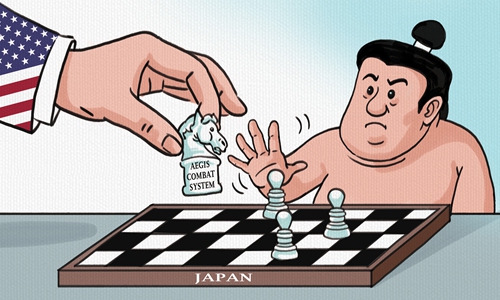Japan no longer little brother at US beck and call
By Chen Yang Source:Global Times Published: 2020/6/17 12:32:11

Illustration: Liu Rui/GT
Japanese Defense Minister Kono Taro announced on Monday that Japan's planned deployments of Aegis Ashore, the land-based US missile defense system, had been halted due to technical problems and costs, according to media reports.Japanese Prime Minister Shinzo Abe's administration was once quite proactive to introduce Aegis Ashore. The abrupt suspension of the deployment plan will undoubtedly cast a shadow over the US-Japan security alliance.
The Japanese government's latest decision to back away from the US defense system is not accidental.
In December 2017, Japan's Cabinet approved plans to install two Aegis Ashore units worth $2.15 billion. Akita and Yamaguchi prefectures were later selected as candidate locations to host the systems.
But the plan was strongly opposed by local residents. Until today, the deployment sites of the Aegis Ashore units have not been officially determined.
Since 2017, Japanese public opinion has questioned the move to introduce the system given how expensive it is. Against the backdrop of a generally stable situation on the Korean Peninsula, it seems to be less and less reasonable to deploy the Aegis Ashore in Japan any more.
When the Japanese government was eager to push for the installation of Aegis Ashore, Japan's primary goal was to appease the US, and ensure that the US-Japan security alliance was stable.
Since US President Donald Trump assumed office in 2017, Trump has more than once made clear he was unhappy with the trade deficit and the security alliance with Japan. He requested Tokyo to pay more for US troops stationed there.
In an attempt to stabilize the alliance with the US, and satisfy Trump's "America First" doctrine, the Abe administration has been proactively expanding imports from the US, boosting investments in the US while purchasing large quantities of American weapons, including Aegis Ashore and fighter jets, to offset deficits with the US. These relevant moves have had effects.
As the past few years saw ups and downs in ties between the US and its other allies, Washington-Tokyo relations have been generally stable. For the Abe administration, paying a big fortune to the US can be argued as win-win.
The sudden suspension of Aegis Ashore deployments seems to be a matter of Japan's internal affair. But it will impact the US-Japan security alliance.
In 2019, the US government formally approved the sale of Aegis Ashore to Japan. This was an official deal between the two countries. The abrupt halting of the plan will inevitably lower Washington's political trust in Tokyo. This will by no means be favorable for the two's future coordination.
The 2020 US presidential election will take place later this year and Trump has been attaching great importance to US economic interests and "made in the USA." These are not only his major achievements over the past few years, but also crucial bargaining chips for his campaign.
Japan's latest decision has without question made Trump look bad. Worse, other countries may follow Japan's lead and dump deals with Trump.
Compared with the US-made Terminal High Altitude Area Defense system deployed in South Korea, Aegis Ashore has a wider coverage area in missile defense. It has the ability to engage longer-range ballistic missiles. The Japanese government has repeatedly emphasized that the deployment of Aegis Ashore is for national security. Yet under the framework of the US-Japan security alliance, Aegis Ashore, if installed in Japan, will surely play a role of monitoring China and Russia as a part of the US' strategic deployment in the Asia-Pacific region. Of course, Japan's suspension mirrors the US' declining capability to totally control its allies.
The year of 2020 marks the 60th anniversary of the signing of the US-Japan Treaty of Mutual Cooperation and Security. It is not easy for both, previous enemy and current ally, to go hand in hand for 60 years. The US-Japan security alliance will not collapse any time soon. But their intimacy will keep declining.
In the past, Japan would choose to sacrifice its own interests to meet US demands. Now, halting the deployment plan of Aegis Ashore seems like a trivial matter, but it shows that the alliance between Washington and Tokyo is not as solid as it might appear. Japan is no longer the little brother of the US acting at Washington's beck and call.
The author is a media professional and an observer of Japan issues. opinion@globaltimes.com.cn
RELATED ARTICLES:
Posted in: ASIAN REVIEW